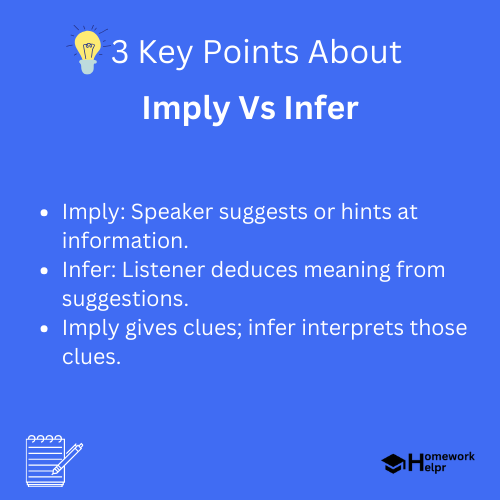📝 Summary
Understanding imply and infer is essential for effective communication. To imply means to suggest something indirectly, requiring listeners to interpret hints. In contrast, to infer is to draw conclusions based on evidence or reasoning. These terms coexist, as speakers imply and listeners infer, enhancing mutual understanding. Recognizing common mistakes, such as confusing the two, can sharpen communication skills. By practicing this distinction, individuals can become more proficient and thoughtful communicators. Lastly, the origins of the words add depth to their meanings.
Understanding the Difference Between Imply and Infer
Language is a complex and fascinating tool that allows us to communicate our thoughts, feelings, and ideas. Among the many words we use, imply and infer often get confused with each other. While they may seem synonymous, they have distinct meanings and uses. Grasping the difference between these two terms is essential for strong communication skills. In this article, we will explore the definitions, implications, examples, and effective usage of imply and infer.
The Definition of Imply
To imply means to suggest something indirectly. The speaker or writer indicates an idea without stating it outright. This often requires the listener or reader to pick up on these hints and draw their own conclusions. For instance, when someone says, “It’s getting late,” they might be implying that it’s time to go home without saying it directly. Understanding the implication can enhance your ability to read between the lines.
Definition
Imply: To express an idea or feeling indirectly through a suggestion rather than through explicit statements.
The Definition of Infer
On the other hand, to infer is to draw a conclusion based on evidence or reasoning. It is the mental process through which a listener or reader interprets the meaning of what has been said or written. If someone says, “The ground is wet; it must have rained,” the listener is inferring that rain is the cause of the wet ground. This process is essential for critical thinking and comprehension.
Definition
Infer: To deduce or conclude information from evidence rather than from explicit statements.
How Imply and Infer Work Together
Understanding how implying and inferring work together can greatly improve communication. The speaker may imply something, and the listener must infer the intended meaning. For effective communication, both parties must be attuned to these nuances.
- When a teacher says, “Some students need to study harder,” he or she is implying that certain students are not performing well.
- The students who hear this statement can infer that they are being encouraged to put in more effort.
Examples
For example, if a friend says, “It would be nice to have some ice cream right now,” you can infer that they would like to have ice cream soon, even if they didn’t outright ask for it.
Examples of Imply and Infer in Everyday Language
Let‚’ take a closer look at some practical examples that illustrate implying and inferring:
- When a manager says, ‚ÄúI notice Richard is often late,” he may be implying that punctuality is important, prompting team members to reflect on their own attendance.
- A parent might imply concern for a child’s behavior by saying, ‚ÄúSchool can be a challenging place,” leading the child to infer that they should pay attention to what is happening in school.
Examples
If a writer states, “The sun dipped below the horizon, painting the sky with colors of orange and purple,” they are implying a beautiful sunset. The reader can then infer that the writer is setting an emotional mood through this imagery.
Common Mistakes to Avoid
Many people tend to misuse imply and infer, often swapping them in everyday conversation. To overcome this confusion, consider the following tips:
- Remember, imply is used when a person is conveying a message indirectly.
- Infer is used by the person who is interpreting or concluding the meaning.
- Use context clues to understand whether something is being implied or inferred.
Fun Fact
❓Did You Know?
Did you know that the origins of the words “imply” and “infer” come from Latin? “Imply” comes from “implicare,” meaning to entangle or involve, while “infer” is derived from “inferre,” which means to bring in or carry over.
Conclusion
In summary, the terms imply and infer are essential components of effective communication. Remember that to imply is to hint at something indirectly, whereas to infer is to make a logical conclusion based on evidence. By understanding the distinction between these two terms, you can enhance both your speaking and listening skills.
As you continue to develop your language abilities, practice recognizing when you or others are implying or inferring. This skill will not only improve your comprehension of conversations and texts, but it will also make you a more proficient and thoughtful communicator. Happy learning!

Related Questions on Imply Vs Infer
What does imply mean?
Answer: It means to suggest indirectly.
What does infer mean?
Answer: It means to draw a conclusion.
How do imply and infer work together?
Answer: The speaker implies while the listener infers.
Why are these terms important?
Answer: They enhance effective communication skills.
